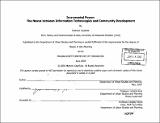Incremental power : the nexus between information technologies and community development
Author(s)
Caulfield, Michelle, 1969-
DownloadFull printable version (15.48Mb)
Other Contributors
Massachusetts Institute of Technology. Dept. of Urban Studies and Planning.
Advisor
Lorlene Hoyt.
Terms of use
Metadata
Show full item recordAbstract
In today's postindustrial society, considering connections between power, knowledge, and information is fundamental to promoting democracy and equity. This thesis examines current and potential uses of information technologies in community development work. It argues that while these technologies are vital to developing and implementing sound policy, they are also valuable tools for fostering greater community dialogue, encouraging broad collaboration, and building community capacity to effect sustained positive change. Research is specifically designed to inform a nascent university-community partnership between the Department of Urban Studies and Planning at the Massachusetts Institute of Technology in Cambridge, Massachusetts and Lawrence CommunityWorks, Inc., a community development corporation in Lawrence, Massachusetts. The goal of this multiyear partnership is to design, implement, and evaluate a neighborhood information system (NIS) as a strategy for empowering residents and supporting community development efforts in Lawrence. The approach of the thesis is to provide a theoretical and practical framework for this investigation. Technological advances, the devolution of social policy down to local agencies, and comprehensive community building efforts underscore the importance of information technologies in planning, organizing, and advocating for neighborhood change. Furthermore, the ability of citizens to access and use data and technology is fundamental to community empowerment. Quantitative and qualitative research methods are used to evaluate existing NIS and to document and inform the work in Lawrence. Findings suggest that while traditional NIS systems add value to public policy by providing access to reliable data, these systems fall short of building information literacy and technological fluency within neighborhoods. Citizen involvement, information and technology training, cross-cutting collaborations, and public agency partners are critical for successful and sustainable community-based technology projects. Recommendations for the Lawrence partnership emphasize the use of information technologies to support a network of formal and informal capacity building of residents, community leaders, community-based organizations, and institutions. Furthermore, given the widespread interest in the using information technologies to empower citizens, additional research into metrics and indicators of community capacity and community power is needed.
Description
Thesis (M.C.P.)--Massachusetts Institute of Technology, Dept. of Urban Studies and Planning, 2003. Includes bibliographical references (p. 123-132).
Date issued
2003Department
Massachusetts Institute of Technology. Department of Urban Studies and PlanningPublisher
Massachusetts Institute of Technology
Keywords
Urban Studies and Planning.